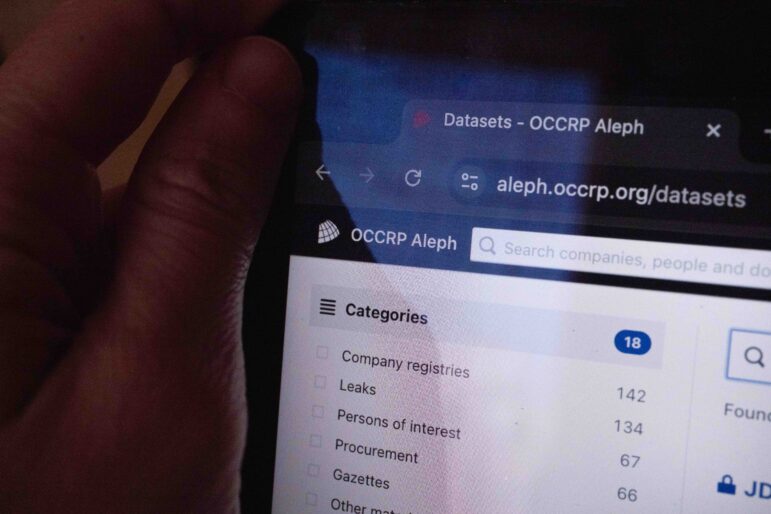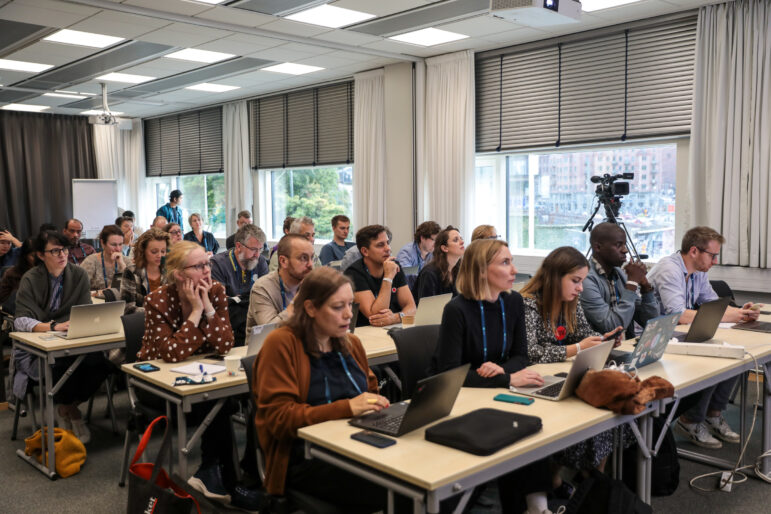Resource Tipsheet
Tipsheet: How Journalists Can Use a UN Process to Evaluate National Human Rights Records
The UN process for evaluating national human rights records is long and complex, but offers valuable material for journalists.
GIJN’s Resource Center is here to help journalists expand their knowledge and skills. The Center holds more than 2,000 items in 14 languages – from tip sheets and guides to instructional videos. Use the menu on the right to navigate it or the search box below to find topics you’re interested in.
The UN process for evaluating national human rights records is long and complex, but offers valuable material for journalists.
The US government engages with virtually every country in the world and each new president can radically change its policy. Here’s GIJN’s updated tipsheet on digging into global US influence.

In investigative journalism, connecting data points is often key to uncovering the truth. Aleph helps reporters search, organize, and analyze data, to better trace hidden connections.
Nonprofit organizations dedicated to offering grants in support of investigative journalism in Africa.

There is a treasure trove of compelling visual evidence out there that is going unused by many watchdog journalists. Here’s how to find it.

A Pulitzer Center toolkit for illegal, unreported, and unregulated (IUU) fishing, which impacts marine ecosystems, coastal communities, food security, and human rights.

Telegram’s rapid growth means reporters and investigators need to become trained in new tools that can be used to search and analyze data from the platform.

Investigations into what happens on, under, and around the ocean can often be answered thanks to the vast amount of data available online.

Experts agree that AI-driven audio deepfakes could pose a significant threat to democracy and fair elections in 2024.
Open source information can be a valuable method of reporting when investigating violations of international humanitarian law or war crimes.
A quick reference guide to reporting on attacks on civilians during armed conflicts as part of investigations into war crimes.

Knowing where to look for data — and accessing it via scraping data from websites — can be a powerful force multiplier for investigative journalists.

An accurate understanding of the applicable laws by journalists can ensure and improve credible reporting, and raise awareness of potential violations.

Based on an interview with Wayback Machine’s director, Mark Graham, ProPublica’s Craig Silverman shares more essential tips on using it, including how to bulk archive pages, compare changes, and see when elements of a page were archived.
A comprehensive list of national, regional, and global reporting grants and fellowships.
At a recent GIJN online workshop, open source research expert Henk van Ess offered key tips and techniques for optimizing the use of Google search in your investigations.
In this edition of GIJN Toolbox, we examine the latest advancements from the IRE22 conference on data extraction and optical character recognition (OCR) tools for turning unwieldy documents into searchable spreadsheets.
The figures are grim for our colleagues around the world. Since 1992, 978 journalists have been killed, according to the Committee to Protect Journalists. More than 60 percent have been murdered with impunity; that is, no killer was ever brought to justice. And today, 232 journalists are in prison worldwide, many for doing what would […]
At the NICAR22 conference in Atlanta, Georgia, journalism trainer MaryJo Webster offered a series of basic tips for editors who have little to no data analysis skills.
After the opening, plenary session of GIJC21, Mediapart editor and French journalist icon Edwy Plenel spoke with GIJN’s French editor, Marthe Rubio, to offer five, high-level tips for running a successful investigative news outlet.
Networks of business interests, government officials, and criminal groups run illegal operations that harm the environment in multiple ways. They drive worldwide illegal trafficking in wildlife and seafood, timber, minerals, hazardous waste, and toxic chemicals. Such environmental crimes are sometimes connected with other criminal activity, such as drug trafficking and money laundering.
In June, a French court indicted executives from two surveillance companies on charges of complicity in torture in Libya and Egypt, following revelations by journalists about their alleged technology sales to repressive regimes. In a series of interviews, investigative reporters shared tips and tools that newsrooms around the world can use to uncover the spyware and monitoring systems their governments are buying.
The Internet Archive is a nonprofit library that is best known for the Wayback Machine, a staple for investigative journalists around the world. Launched 20 years ago, the Wayback Machine now archives much of the public web at the rate of more than 1 billion archived URLs per day.
Looking for tips, tools, and tutorials? The below guides focus on investigative journalism and provide case studies and examples from around the world. Most are available for free, unless indicated otherwise. You can also find our guide to investigative journalism manuals in Chinese and Spanish. Have an addition that you’d like to share? Send us […]
The excessive force used against anti-racism protesters around the world, in the wake of the killing of George Floyd in the US, reveals the need for more visual forensic skills in newsrooms to hold police to account. GIJN identified 12 tools and 12 methods that proved effective in several recent investigations that exposed harm done by security forces.
Our curation of the most prominent data centers in Africa.
Looking to learn a new programming language or improve your spreadsheet skills? These online vendors offer free or low-cost online courses and video tutorials on a variety of topics and languages. Check GIJN’s YouTube page for the free webinars. The Social Data School, led by Cambridge Digital Humanities in association with the Minderoo Centre for […]
There are a plethora of programs available for data visualization. Some are very simple to use and require no coding, while others are more difficult to learn but offer greater flexibility and interactivity. Here are some of the most popular options for journalists. ArcGIS online is a tool from Esri to create and share online […]